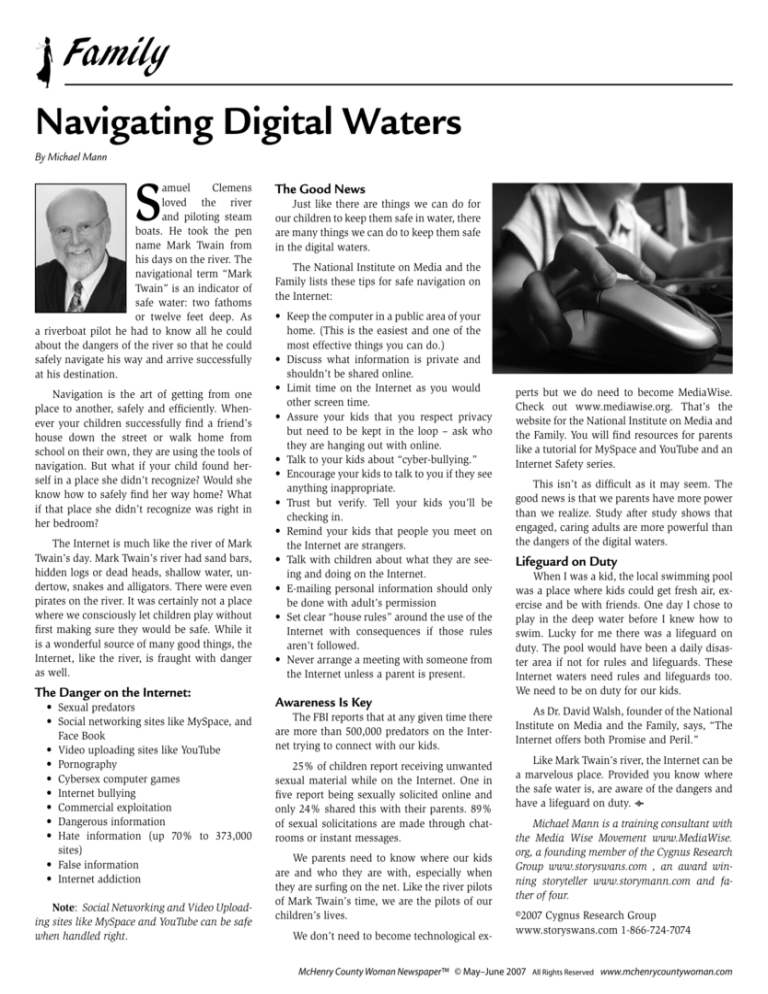
Family
Navigating Digital Waters
By Michael Mann
S
amuel
Clemens
loved the river
and piloting steam
boats. He took the pen
name Mark Twain from
his days on the river. The
navigational term “Mark
Twain” is an indicator of
safe water: two fathoms
or twelve feet deep. As
a riverboat pilot he had to know all he could
about the dangers of the river so that he could
safely navigate his way and arrive successfully
at his destination.
Navigation is the art of getting from one
place to another, safely and efficiently. Whenever your children successfully find a friend’s
house down the street or walk home from
school on their own, they are using the tools of
navigation. But what if your child found herself in a place she didn’t recognize? Would she
know how to safely find her way home? What
if that place she didn’t recognize was right in
her bedroom?
The Internet is much like the river of Mark
Twain’s day. Mark Twain’s river had sand bars,
hidden logs or dead heads, shallow water, undertow, snakes and alligators. There were even
pirates on the river. It was certainly not a place
where we consciously let children play without
first making sure they would be safe. While it
is a wonderful source of many good things, the
Internet, like the river, is fraught with danger
as well.
The Danger on the Internet:
• Sexual predators
• Social networking sites like MySpace, and
Face Book
• Video uploading sites like YouTube
• Pornography
• Cybersex computer games
• Internet bullying
• Commercial exploitation
• Dangerous information
• Hate information (up 70% to 373,000
sites)
• False information
• Internet addiction
Note: Social Networking and Video Uploading sites like MySpace and YouTube can be safe
when handled right.
The Good News
Just like there are things we can do for
our children to keep them safe in water, there
are many things we can do to keep them safe
in the digital waters.
The National Institute on Media and the
Family lists these tips for safe navigation on
the Internet:
•Keep the computer in a public area of your
home. (This is the easiest and one of the
most effective things you can do.)
•Discuss what information is private and
shouldn’t be shared online.
•Limit time on the Internet as you would
other screen time.
•Assure your kids that you respect privacy
but need to be kept in the loop – ask who
they are hanging out with online.
•Talk to your kids about “cyber-bullying.”
•Encourage your kids to talk to you if they see
anything inappropriate.
•Trust but verify. Tell your kids you’ll be
checking in.
•Remind your kids that people you meet on
the Internet are strangers.
•Talk with children about what they are seeing and doing on the Internet.
•E-mailing personal information should only
be done with adult’s permission
•Set clear “house rules” around the use of the
Internet with consequences if those rules
aren’t followed.
•Never arrange a meeting with someone from
the Internet unless a parent is present.
Awareness Is Key
The FBI reports that at any given time there
are more than 500,000 predators on the Internet trying to connect with our kids.
25% of children report receiving unwanted
sexual material while on the Internet. One in
five report being sexually solicited online and
only 24% shared this with their parents. 89%
of sexual solicitations are made through chatrooms or instant messages.
We parents need to know where our kids
are and who they are with, especially when
they are surfing on the net. Like the river pilots
of Mark Twain’s time, we are the pilots of our
children’s lives.
We don’t need to become technological ex-
perts but we do need to become MediaWise.
Check out www.mediawise.org. That’s the
website for the National Institute on Media and
the Family. You will find resources for parents
like a tutorial for MySpace and YouTube and an
Internet Safety series.
This isn’t as difficult as it may seem. The
good news is that we parents have more power
than we realize. Study after study shows that
engaged, caring adults are more powerful than
the dangers of the digital waters.
Lifeguard on Duty
When I was a kid, the local swimming pool
was a place where kids could get fresh air, exercise and be with friends. One day I chose to
play in the deep water before I knew how to
swim. Lucky for me there was a lifeguard on
duty. The pool would have been a daily disaster area if not for rules and lifeguards. These
Internet waters need rules and lifeguards too.
We need to be on duty for our kids.
As Dr. David Walsh, founder of the National
Institute on Media and the Family, says, “The
Internet offers both Promise and Peril.”
Like Mark Twain’s river, the Internet can be
a marvelous place. Provided you know where
the safe water is, are aware of the dangers and
have a lifeguard on duty. K
Michael Mann is a training consultant with
the Media Wise Movement www.MediaWise.
org, a founding member of the Cygnus Research
Group www.storyswans.com , an award winning storyteller www.storymann.com and father of four.
©2007 Cygnus Research Group
www.storyswans.com 1-866-724-7074
McHenry County Woman Newspaper™ © May–June 2007
All Rights Reserved
www.mchenrycountywoman.com








